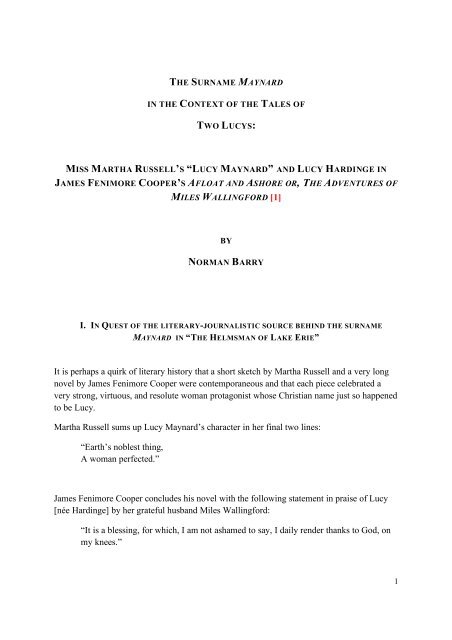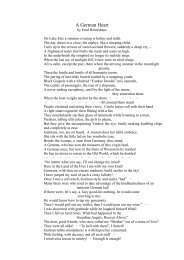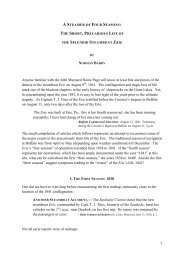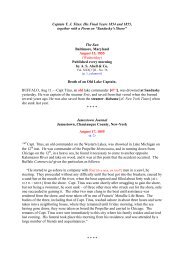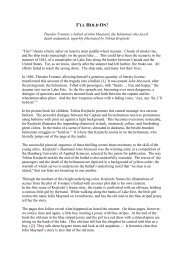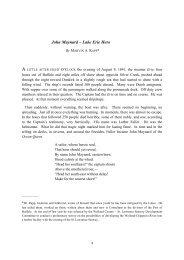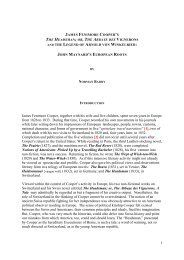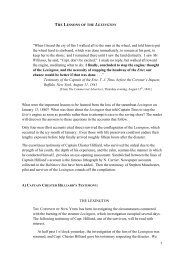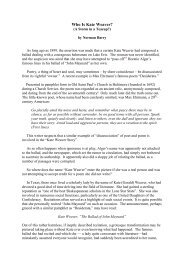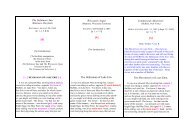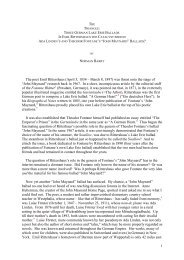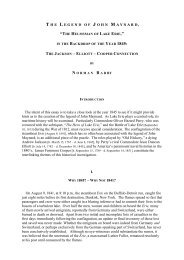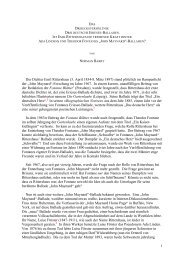AAA_Lucy in the Sky with Diamonds_c - John Maynard Home Page
AAA_Lucy in the Sky with Diamonds_c - John Maynard Home Page
AAA_Lucy in the Sky with Diamonds_c - John Maynard Home Page
Create successful ePaper yourself
Turn your PDF publications into a flip-book with our unique Google optimized e-Paper software.
THE SURNAME MAYNARD<br />
IN THE CONTEXT OF THE TALES OF<br />
TWO LUCYS:<br />
MISS MARTHA RUSSELL’S “LUCY MAYNARD” AND LUCY HARDINGE IN<br />
JAMES FENIMORE COOPER’S AFLOAT AND ASHORE OR, THE ADVENTURES OF<br />
MILES WALLINGFORD [1]<br />
BY<br />
NORMAN BARRY<br />
I. IN QUEST OF THE LITERARY-JOURNALISTIC SOURCE BEHIND THE SURNAME<br />
MAYNARD IN “THE HELMSMAN OF LAKE ERIE”<br />
It is perhaps a quirk of literary history that a short sketch by Martha Russell and a very long<br />
novel by James Fenimore Cooper were contemporaneous and that each piece celebrated a<br />
very strong, virtuous, and resolute woman protagonist whose Christian name just so happened<br />
to be <strong>Lucy</strong>.<br />
Martha Russell sums up <strong>Lucy</strong> <strong>Maynard</strong>’s character <strong>in</strong> her f<strong>in</strong>al two l<strong>in</strong>es:<br />
“Earth’s noblest th<strong>in</strong>g,<br />
A woman perfected.”<br />
James Fenimore Cooper concludes his novel <strong>with</strong> <strong>the</strong> follow<strong>in</strong>g statement <strong>in</strong> praise of <strong>Lucy</strong><br />
[née Hard<strong>in</strong>ge] by her grateful husband Miles Wall<strong>in</strong>gford:<br />
“It is a bless<strong>in</strong>g, for which, I am not ashamed to say, I daily render thanks to God, on<br />
my knees.”<br />
1
The first object of this study is to consider what similarities <strong>the</strong> two <strong>Lucy</strong>s embody that could<br />
merit, <strong>in</strong> <strong>the</strong> eyes of a modern reader, such seem<strong>in</strong>gly exuberant praise. A second<br />
consideration is, naturally, <strong>the</strong> question as to why James Fenimore Cooper would have been<br />
motivated to read <strong>the</strong> Russell sketch <strong>in</strong> <strong>the</strong> first place. And, last but not least, <strong>the</strong>re is <strong>the</strong><br />
question as to why Russell’s tale could have readily motivated Cooper to borrow <strong>the</strong> surname<br />
as <strong>the</strong> appellation of his heroic protagonist <strong>in</strong> “The Helmsman of Lake Erie.” [2]<br />
It will be noted that no researcher has yet bo<strong>the</strong>red to look for a literary-journalistic<br />
antecedent to expla<strong>in</strong> <strong>the</strong> choice of <strong>the</strong> surname <strong>Maynard</strong> <strong>in</strong> “The Helmsman of Lake Erie,”<br />
although <strong>in</strong> <strong>the</strong> 1960’s, George Salomon, <strong>the</strong> Theodor Fontane researcher of <strong>the</strong> famous<br />
German ballad “<strong>John</strong> <strong>Maynard</strong>,” immediately labeled <strong>the</strong> 1845 “Helmsman of Lake Erie” a<br />
“literary-journalistic” creation [3]. In spite of that <strong>in</strong>itial <strong>in</strong>sight, Salomon did not pursue this<br />
cha<strong>in</strong> of thought by review<strong>in</strong>g <strong>the</strong> American press <strong>in</strong> <strong>the</strong> first half of <strong>the</strong> 1840’s to see<br />
whe<strong>the</strong>r, <strong>in</strong> fact, a literary-journalistic <strong>Maynard</strong> antecedent existed. As it turns out, he would<br />
not have had far to look, for Martha Russell’s sketch was published <strong>in</strong> <strong>the</strong> April [1 st ] 1844<br />
issue of The Columbian, only seventeen months before “The Helmsman of Lake Erie” first<br />
appeared <strong>in</strong> <strong>the</strong> August 31, 1845 issue of The Baltimore Sun.<br />
II. THE SIGNIFICANCE OF THE COLUMBIAN, ITS PROMINENCE AT THE NATIONAL<br />
LEVEL, AND THE NATIONAL WRITERS IT SOUGHT TO RECRUIT<br />
That Martha Russell’s sketch received national coverage is evident from its place of<br />
publication and <strong>the</strong> circumstances surround<strong>in</strong>g <strong>the</strong> periodical which put out her piece: The<br />
Columbian Lady’s and Gentleman’s Magaz<strong>in</strong>e, New York City’s brand new monthly<br />
literary and cultural publication, was launched on January 1 st , 1844. Although rashly<br />
aspir<strong>in</strong>g to achieve cultural hegemony over its competitors, particularly over <strong>the</strong> higherpay<strong>in</strong>g<br />
Philadelphia-based Graham’s Magaz<strong>in</strong>e, to which, for example, Cooper contributed<br />
his naval biographies, The Columbian was doomed to fold <strong>with</strong><strong>in</strong> only five years. Yet on<br />
January 1 st , 1844, thoughts of failure were not enterta<strong>in</strong>ed. Visions of recruit<strong>in</strong>g America’s<br />
very best writers were uppermost and ev<strong>in</strong>ced <strong>in</strong> <strong>the</strong> January 1 st list of writers The<br />
Columbian <strong>in</strong>tended to recruit. The second name <strong>in</strong> that list was “J. F. Cooper.” [4 &<br />
Appendix A]<br />
It goes <strong>with</strong>out say<strong>in</strong>g that <strong>the</strong> success or failure of <strong>the</strong> ambitious fledgl<strong>in</strong>g New York literary<br />
monthly would not fail to attract <strong>the</strong> close attention of America’s lead<strong>in</strong>g authors, who, we<br />
may reasonably assume, were approached by The Columbian for contributions. Although<br />
Cooper did not provide a contribution for <strong>the</strong> year 1844, it goes <strong>with</strong>out say<strong>in</strong>g that as a<br />
resident of <strong>the</strong> state of New York and as America’s first professional writer, he would have<br />
kept an alert eye on <strong>the</strong> publication’s contents and contributors.<br />
2
It was <strong>in</strong> <strong>the</strong> April 1844 issue of The Columbian that Martha Russell’s “<strong>Lucy</strong> <strong>Maynard</strong>”<br />
appeared. With<strong>in</strong> only a month, <strong>the</strong> sketch was subject to repr<strong>in</strong>t<strong>in</strong>g, particularly <strong>in</strong> New<br />
England, where Martha Russell resided. [5 & Appendix B]<br />
III. COOPER’S LITERARY ACTIVITY AT THE TIME<br />
MARTHA RUSSELL’S SKETCH APPEARED<br />
From December 1843 through August 1844, Cooper was engaged <strong>in</strong> writ<strong>in</strong>g his most<br />
ambitious work up to that time, Afloat and Ashore or, The Adventures of Miles Wall<strong>in</strong>gford,<br />
which was not two novels but one cont<strong>in</strong>uous novel issued <strong>in</strong> two parts, Part I submitted for<br />
publication by mid-April and appear<strong>in</strong>g <strong>in</strong> New York, Philadelphia and London <strong>in</strong> early June<br />
1844. It is significant that <strong>the</strong> second part (sent off on August 29, 1844), which was pr<strong>in</strong>ted <strong>in</strong><br />
England by Richard Bentley not till September 28, 1844, bore <strong>the</strong> title <strong>Lucy</strong> Hard<strong>in</strong>ge: A<br />
Second Series of Afloat and Ashore. Given <strong>the</strong> dates <strong>in</strong>volved [6], <strong>the</strong> assumption can safely<br />
be made that Russell’s sketch was <strong>in</strong> a position to exert an <strong>in</strong>fluence on <strong>the</strong> second half of<br />
Cooper’s mammoth novel. As Part I of Afloat and Ashore was completed <strong>in</strong> <strong>the</strong> same month<br />
<strong>in</strong> which Russell’s sketch was published, it may be assumed that, if any direct or <strong>in</strong>direct<br />
<strong>in</strong>fluence was <strong>in</strong>deed brought to bear, only Part II could have been affected. All of this<br />
not<strong>with</strong>stand<strong>in</strong>g, <strong>the</strong> aff<strong>in</strong>ity of Part I of Cooper’s novel and Martha Russell’s sketch may<br />
strike <strong>the</strong> reader as more than mere co<strong>in</strong>cidence.<br />
The very idea of a writer borrow<strong>in</strong>g a name from ano<strong>the</strong>r author’s literary work, is alluded to<br />
<strong>in</strong> conjunction <strong>with</strong> <strong>the</strong> creation of <strong>the</strong> surname Marble <strong>in</strong> Afloat and Ashore or, The<br />
Adventures of Miles Wall<strong>in</strong>gford. In this case, Moses Marble, who was placed <strong>in</strong> a basket as<br />
an <strong>in</strong>fant and deposited on a cold tombstone, grows up <strong>with</strong>out even know<strong>in</strong>g <strong>the</strong> real name of<br />
his parents. Marble suffers immensely from <strong>the</strong> fact that he has never had a family or<br />
relations he can call his own. At one po<strong>in</strong>t, he compla<strong>in</strong>s bitterly:<br />
“They hadn’t <strong>the</strong> decency to p<strong>in</strong> even a name – <strong>the</strong>y might have got one out of a novel<br />
or a story-book, you know, to start a poor fellow <strong>in</strong> life <strong>with</strong> – to my shirt [my italics]; no<br />
– <strong>the</strong>y just set me afloat on that bit of a tombstone, and cast off <strong>the</strong> stand<strong>in</strong>g part of<br />
what fastened me to anyth<strong>in</strong>g human. There <strong>the</strong>y left me, to generalize on <strong>the</strong> ‘arth<br />
and its ways, to my heart’s content.” Afloat and Ashore or, The Adventures of Miles<br />
Wall<strong>in</strong>gford – Cooper AMS Edition, Pt. I, Ch. XIX, p. 288<br />
The name Moses is <strong>in</strong>deed taken from <strong>the</strong> Biblical story of <strong>the</strong> <strong>in</strong>fant Moses placed <strong>in</strong> a basket<br />
and set afloat on <strong>the</strong> Nile, for Moses Marble was also abandoned <strong>in</strong> a basket. The<br />
associations called forth to alight on <strong>the</strong> name Marble, however, are ano<strong>the</strong>r matter:<br />
3
“….Moses came from <strong>the</strong> scriptur’s, <strong>the</strong>y tell me; <strong>the</strong>re be<strong>in</strong>g a person of that name, as<br />
I understand, who was turned adrift pretty much as I was, myself.”<br />
“Why, yes – so far as <strong>the</strong> basket and <strong>the</strong> abandonment were concerned; but he was<br />
put afloat fairly, and not clapped on a tomb-stone, as if to threaten him <strong>with</strong> <strong>the</strong> grave<br />
from <strong>the</strong> very outset.”<br />
“Well, Tombstone came very near be<strong>in</strong>g my name. At first, <strong>the</strong>y thought of<br />
giv<strong>in</strong>g me <strong>the</strong> name of <strong>the</strong> man for whom <strong>the</strong> stone was <strong>in</strong>tended; but that be<strong>in</strong>g<br />
Zollickhoffer, <strong>the</strong>y thought I never should be able to spell it. Then came Tombstone,<br />
which <strong>the</strong>y thought melancholy, and so <strong>the</strong>y called me Marble; consait<strong>in</strong>g, I suppose,<br />
it would make me tough.” Ibid., Pt. I, Ch. XIX, p. 289<br />
In o<strong>the</strong>r words, <strong>the</strong> writer Cooper did borrow from stories and was not immune to <strong>the</strong><br />
associations that a name (e.g., Moses) could evoke or, vice versa and of far greater import,<br />
that could evoke a surname (e.g., Marble).<br />
The suggestion Cooper allows Moses Marble to make, namely tak<strong>in</strong>g a name “out of a novel<br />
or a story-book,” is <strong>the</strong> subject matter of this essay.<br />
IV. AN 1841 STEAMBOAT DISASTER AND<br />
THE BATTLE OF LAKE ERIE IN AFLOAT AND ASHORE<br />
Although Afloat and Ashore or, The Adventures of Miles Wall<strong>in</strong>gford makes no mention of<br />
<strong>the</strong> conflagration of <strong>the</strong> steamboat Erie on August 9 th , 1841, <strong>the</strong> only steamer that would seem<br />
to serve as a foil for <strong>the</strong> action of <strong>the</strong> 1845 “Helmsman” sketch, <strong>the</strong> loss of <strong>the</strong> President [Pt. I,<br />
p. 406], only five months prior to <strong>the</strong> Erie disaster, is referred to. The notes <strong>in</strong> <strong>the</strong> Cooper<br />
Edition provide background <strong>in</strong>formation:<br />
“<strong>the</strong> President steamer: The largest steamship of her day, <strong>the</strong> side-wheeler President<br />
and her 136 passengers and crew disappeared <strong>with</strong>out a trace <strong>in</strong> a storm that swept <strong>the</strong><br />
Atlantic shortly after she sailed from New York on 11 March 1841.”<br />
Afloat and Ashore or, The Adventures of Miles Wall<strong>in</strong>gford – Cooper<br />
AMS Edition, Pt. I, Explanatory Notes, p. 529.<br />
It is obvious that Cooper was very well <strong>in</strong>formed of <strong>the</strong> ill-fated Erie, as his lifelong friend<br />
and neighbor, Judge Samuel Nelson, had personally accompanied Levi Beebe, a cadet from<br />
<strong>the</strong> Cooperstown Military Academy, to Buffalo, New York, where <strong>the</strong> youth boarded <strong>the</strong> Erie<br />
on his way home to Cleveland. [7] The boy, described as “not twelve years of age,” was one<br />
of <strong>the</strong> survivors of <strong>the</strong> conflagration. But, more than that, he was able to survive through his<br />
4
unrelent<strong>in</strong>g courage and endurance, which he had <strong>in</strong> no small part acquired at <strong>the</strong> Academy <strong>in</strong><br />
Cooperstown. Young Levi received more national coverage than <strong>the</strong> spr<strong>in</strong>kl<strong>in</strong>g of allusions<br />
to a resolute young helmsman named Lu<strong>the</strong>r Fuller, who had allegedly rema<strong>in</strong>ed at <strong>the</strong> wheel<br />
until overcome by <strong>the</strong> flames and smoke. As Levi Beebe must have been <strong>the</strong> celebrated hero<br />
of Cooperstown, one would suppose that America’s premier naval historian might have<br />
ventured a comment or a word of praise. The fact that not a s<strong>in</strong>gle letter or reference has<br />
surfaced need not be taken to mean that noth<strong>in</strong>g was said or written. [8] Ra<strong>the</strong>r, <strong>the</strong> problem<br />
is <strong>the</strong> loss of <strong>in</strong>formation over <strong>the</strong> years and <strong>the</strong> consequent necessity of “read<strong>in</strong>g between <strong>the</strong><br />
l<strong>in</strong>es.”<br />
One can only speculate whe<strong>the</strong>r <strong>the</strong> om<strong>in</strong>ous comment, <strong>in</strong> <strong>the</strong> sentence immediately after <strong>the</strong><br />
allusion to <strong>the</strong> President, might not have been an <strong>in</strong>direct reference to <strong>the</strong> loss of <strong>the</strong> Erie:<br />
“There is no doubt that well constructed steamers are safer craft, <strong>the</strong> danger from fire<br />
excepted [my italics], than <strong>the</strong> ord<strong>in</strong>ary ship, except <strong>in</strong> very heavy wea<strong>the</strong>r.”<br />
Afloat and Ashore or, The Adventures of Miles Wall<strong>in</strong>gford<br />
( Brooklyn, New York: AMS Press, Inc, 2004), AMS Studies <strong>in</strong> <strong>the</strong> N<strong>in</strong>eteenth<br />
Century, no. 31; Pt. I, Ch. XXV, p. 406.<br />
Even a thread lead<strong>in</strong>g back to <strong>the</strong> 1813 Battle of Lake Erie and <strong>the</strong> result<strong>in</strong>g absurd yet<br />
acrimonious controversy as to which commander – Jesse Duncan Elliott (1782-1845) or<br />
Oliver Hazard Perry (1785-1819) – should have taken credit for America’s first decisive<br />
naval victory over a British fleet can be made out <strong>in</strong> Afloat and Ashore or, The Adventures<br />
of Miles Wall<strong>in</strong>gford.<br />
Cooper’s 1839 History of <strong>the</strong> Navy of <strong>the</strong> United States had come down hard aga<strong>in</strong>st Perry’s<br />
conduct <strong>in</strong> <strong>the</strong> Battle of Lake Erie while v<strong>in</strong>dicat<strong>in</strong>g Elliott’s <strong>in</strong> that conflict. He was<br />
immediately opposed by <strong>the</strong> Perry faction, whose standard-bearer was Commander Alexander<br />
Slidell Mackenzie (1803-1848). Mackenzie’s sister was married to Commodore Mat<strong>the</strong>w C.<br />
Perry, <strong>the</strong> bro<strong>the</strong>r of <strong>the</strong> late Commodore Oliver Hazard Perry. Mackenzie was fight<strong>in</strong>g for<br />
<strong>the</strong> honor of <strong>the</strong> Perry family; <strong>the</strong> historian Cooper was bulldoggedly seek<strong>in</strong>g <strong>the</strong><br />
unadulterated truth. The upshot was a series of exchanges beg<strong>in</strong>n<strong>in</strong>g <strong>in</strong> 1839 and extend<strong>in</strong>g to<br />
1844. [9]<br />
Mackenzie, Cooper’s old rival <strong>in</strong> <strong>the</strong> never-end<strong>in</strong>g Perry-Elliott dispute, was court-marshaled<br />
<strong>in</strong> <strong>the</strong> Somers mut<strong>in</strong>y affair for hang<strong>in</strong>g a midshipman and two sailors suspected of mut<strong>in</strong>y on<br />
board <strong>the</strong> tra<strong>in</strong><strong>in</strong>g vessel Somers. In April 1843, he was, however, acquitted. The Philbrick<br />
Historical Introduction of <strong>the</strong> Cooper AMS Edition of Afloat and Ashore, po<strong>in</strong>ts out Cooper’s<br />
reaction:<br />
“…Cooper rema<strong>in</strong>ed dissatisfied <strong>with</strong> <strong>the</strong> conduct of both <strong>the</strong> defendant and <strong>the</strong> Navy,<br />
more and more persuaded that an impulsive and cowardly act had been whitewashed<br />
by <strong>the</strong> naval establishment. By November he was hard at work on an analytical essay<br />
on <strong>the</strong> Somers affair, and by early December <strong>the</strong> essay, which was to appear as an<br />
eighty-page ‘Elaborate Review’ appended to Proceed<strong>in</strong>gs of <strong>the</strong> Naval Court <strong>in</strong> <strong>the</strong><br />
Case of Alexander Slidell Mackenzie published <strong>in</strong> New York by Henry Langley <strong>in</strong><br />
5
1844, was <strong>in</strong> <strong>the</strong> press.” - Thomas Philbrick and Marianne Philbrick, Historical Introduction, p.<br />
xiii.<br />
In Afloat and Ashore or The Adventures of Miles Wall<strong>in</strong>gford, Cooper does not spare<br />
Mackenzie a few broadsides which specifically refer to <strong>the</strong> 1843 Somer affair. He pulls this<br />
off by hav<strong>in</strong>g Miles’s old mate and close friend Moses Marble summarily hang a “wi<strong>the</strong>red,<br />
grey-headed old,” but cunn<strong>in</strong>g, Indian chief significantly named Smudge for attempt<strong>in</strong>g to<br />
make off <strong>with</strong> <strong>the</strong> ship and kill<strong>in</strong>g <strong>the</strong> capta<strong>in</strong>.[10] Hang<strong>in</strong>g old Smudge <strong>with</strong>out a trial was –<br />
how could it be o<strong>the</strong>rwise? – add<strong>in</strong>g a “smudge” to Marble’s naval record and list of deadly<br />
s<strong>in</strong>s. As Miles himself said:<br />
“Still, I knew that Marble wished <strong>the</strong> th<strong>in</strong>g [=<strong>the</strong> hang<strong>in</strong>g] undone when it was too late, it<br />
be<strong>in</strong>g idle to th<strong>in</strong>k of quiet<strong>in</strong>g <strong>the</strong> suggestions of that monitor God has implanted<br />
<strong>with</strong><strong>in</strong> us, by <strong>the</strong> meretricious and selfish approbation of those who judge of right and<br />
wrong by <strong>the</strong>ir own narrow standard of <strong>in</strong>terest.”<br />
Afloat and Ashore or, The Adventures of Miles<br />
Wall<strong>in</strong>gford – Cooper AMS Edition, Pt. 1, Ch. XIV, p. 219 [11]<br />
The associations attached to <strong>the</strong> names of vessels cannot be overlooked <strong>in</strong> Cooper’s works.<br />
When Marble decides he can no longer live as “a ‘bloody hermit’ at Willow Cove,” and<br />
beg<strong>in</strong>s to feel a certa<strong>in</strong> itch to go to sea aga<strong>in</strong>, Miles shows him <strong>the</strong> brand new vessel Marble<br />
will command. Her name: <strong>the</strong> Smudge! [12]<br />
Just before his death, while still on board <strong>the</strong> Smudge, Moses tells Miles:<br />
“I’ve pretty much worn out <strong>the</strong> Smudge, and <strong>the</strong> Smudge has pretty much worn out<br />
me.” Pt. II, Ch. XXX, p. 413<br />
When Moses was called upon to prepare himself for <strong>the</strong> “last great change,” <strong>the</strong> question of<br />
Smudge’s execution aga<strong>in</strong> stubbornly imposed itself:<br />
“There’s that bloody Smudge, not<strong>with</strong>stand<strong>in</strong>g; I hardly th<strong>in</strong>k it will be expected of<br />
me to look upon him as anyth<strong>in</strong>g but a ‘long-shore pirate, and a fellow to be disposed<br />
of <strong>in</strong> <strong>the</strong> shortest possible way.” [….]<br />
“As for Smudge, his [=Marble’s] m<strong>in</strong>d had its misgiv<strong>in</strong>gs concern<strong>in</strong>g <strong>the</strong> propriety of<br />
his own act, and, <strong>with</strong> <strong>the</strong> quickness of his nature, sought to protest itself aga<strong>in</strong>st its<br />
own suggestions, by mak<strong>in</strong>g an exception of <strong>the</strong> wretch, as aga<strong>in</strong>st <strong>the</strong> general<br />
mandates of God.” Pt. II, Ch. XXX, p. 414<br />
By transpos<strong>in</strong>g <strong>the</strong> names Mackenzie and Marble, Cooper – on a literary level - was able to<br />
covertly submit <strong>the</strong> <strong>in</strong>dictment that Mackenzie’s “smudged” conscience worked <strong>in</strong> much <strong>the</strong><br />
same way as Marble’s.<br />
6
V. THE SACRED ENVIRONMENT [13]<br />
The open<strong>in</strong>g paragraph of Russell’s sketch already strikes a chord that Cooper could<br />
sympathize <strong>with</strong>: Nature as a w<strong>in</strong>dow to <strong>the</strong> Creator is holy, and consequently its destruction<br />
is equivalent to desecration. In o<strong>the</strong>r words, a religious argument is offered <strong>in</strong> support of<br />
environmentalism. This is a strong motif <strong>in</strong> Cooper’s writ<strong>in</strong>g – one need only consider The<br />
Pioneers and Natty Bumppo’s condemnation of <strong>the</strong> settlers’ wanton destruction of trees, birds<br />
and fish as well as encroachment on natural habitats. Russell writes:<br />
“There is ano<strong>the</strong>r class of travellers who, from defect of vision, caused not by sun<br />
spots but by dollar spots, see before <strong>the</strong>ir eyes, <strong>in</strong> <strong>the</strong> most beautiful landscapes,<br />
noth<strong>in</strong>g but mill-seats, timber-lots, railroad tracks, choice situations for manufactur<strong>in</strong>g<br />
establishments, and were it practicable, would sell <strong>the</strong> blessed sunlight which<br />
brightens <strong>the</strong> flowers on <strong>the</strong>ir fa<strong>the</strong>r’s graves, for a ‘handsome consideration.’ Heaven<br />
defend us from all such travellers.” - “<strong>Lucy</strong> <strong>Maynard</strong>,” p. 1<br />
The belief that Nature can exert a purify<strong>in</strong>g <strong>in</strong>fluence upon <strong>the</strong> human soul and that it affords<br />
<strong>in</strong>sight <strong>in</strong>to <strong>the</strong> Div<strong>in</strong>e Creator of <strong>the</strong> universe, is shared by both Cooper and Russell. The<br />
world about us, accord<strong>in</strong>g to Russell, provides “<strong>the</strong> true soul” <strong>the</strong> opportunity of “see<strong>in</strong>g God<br />
and listen<strong>in</strong>g to <strong>the</strong> universe, ‘<strong>the</strong> great Æolian harp,’ <strong>with</strong> its solemn and mysterious music<br />
sound<strong>in</strong>g from its countless str<strong>in</strong>gs” [p.1]. Although <strong>the</strong> dichotomy may r<strong>in</strong>g unusually harsh,<br />
virg<strong>in</strong> forests and Nature, represent<strong>in</strong>g <strong>the</strong> “true Temple” of <strong>the</strong> Lord, are set aga<strong>in</strong>st <strong>the</strong><br />
ruthlessness of commerce and <strong>the</strong> superficiality and hypocrisy of fashion and society.<br />
VI. PARALLEL PLOTS – ORPHANS CAST ADRIFT<br />
A) RUSSELL’S “LUCY MAYNARD”<br />
<strong>Lucy</strong> <strong>Maynard</strong>, whose fa<strong>the</strong>r had been a sea capta<strong>in</strong>, who was lost at sea, and whose<br />
mo<strong>the</strong>r died of a broken heart upon los<strong>in</strong>g him, became an orphan by <strong>the</strong> age of five. Yet she<br />
was still “rid<strong>in</strong>g at anchor.” She had her beloved Aunt Es<strong>the</strong>r, her mo<strong>the</strong>r’s cultivated and<br />
warm-hearted sister. It was only after Aunt Es<strong>the</strong>r’s death, that <strong>Lucy</strong> was sent to her fa<strong>the</strong>r’s<br />
bro<strong>the</strong>r, Uncle <strong>John</strong> <strong>Maynard</strong>, a k<strong>in</strong>d-hearted and resolute man, who unfortunately fell upon<br />
hard times and was obliged to move out West. <strong>Lucy</strong>, not wish<strong>in</strong>g to be an additional burden<br />
upon Uncle <strong>John</strong>’s hard-put family, <strong>in</strong>sisted upon tak<strong>in</strong>g an apprenticeship so that she would<br />
later be able to support herself. After considerable reluctance, her adamant request was<br />
granted.<br />
7
Henry Stanton, Charles Stanton’s fa<strong>the</strong>r, owned a great estate “<strong>in</strong> eastern Massachusetts.”<br />
Believ<strong>in</strong>g his wealth to be such that it could never be dissipated, he did not tend to his<br />
f<strong>in</strong>ancial affairs but left such matters <strong>in</strong> <strong>the</strong> hands of <strong>in</strong>capable adm<strong>in</strong>istrators. Henry also<br />
became ever more addicted to strong dr<strong>in</strong>k. As his f<strong>in</strong>ances and health deteriorated, he<br />
borrowed money on credit. Not only did an early grave await him as a result of his dissolute<br />
life style, but he also left a wife and a son almost penniless. Ellen Stanton, his widow,<br />
<strong>the</strong>reupon decided to live <strong>with</strong> her old friend, who was none o<strong>the</strong>r than Aunt Es<strong>the</strong>r. Thus <strong>the</strong><br />
boy Charles Stanton and <strong>the</strong> girl <strong>Lucy</strong> <strong>Maynard</strong> were thrown toge<strong>the</strong>r as children. Charles<br />
was two years older than <strong>Lucy</strong>. The two children grew up toge<strong>the</strong>r. Charles was like an elder<br />
bro<strong>the</strong>r who looked after <strong>Lucy</strong>. Unfortunately for young Charles, Ellen Stanton decided to<br />
enter <strong>in</strong>to a marriage of expediency by marry<strong>in</strong>g “a worthy farmer.” Although no longer<br />
liv<strong>in</strong>g toge<strong>the</strong>r <strong>with</strong> Aunt Es<strong>the</strong>r and <strong>Lucy</strong>, Charles cont<strong>in</strong>ued his studies under <strong>the</strong> benevolent<br />
tutelage of “<strong>the</strong> old pastor, Mr. Clayton.” (Here aga<strong>in</strong>, <strong>in</strong> each story a venerable clergyman<br />
plays a significant role: Mr. Clayton <strong>in</strong> Martha Russell’s sketch and Mr. Hard<strong>in</strong>ge <strong>in</strong> Cooper’s<br />
novel.) When Charles’s mo<strong>the</strong>r died, his situation became ever more desperate, as <strong>the</strong> farmer<br />
saw no sense <strong>in</strong> wast<strong>in</strong>g time <strong>with</strong> books, whereas for Charles <strong>the</strong> <strong>in</strong>tellectual side of life was<br />
much more to his lik<strong>in</strong>g than farm<strong>in</strong>g. Consequently, Charles, though sad to leave <strong>Lucy</strong>, set<br />
out for <strong>the</strong> West to live <strong>with</strong> his mo<strong>the</strong>r’s bro<strong>the</strong>r, Uncle Gordon, who understood <strong>the</strong> value of<br />
books and <strong>the</strong> knowledge <strong>the</strong>y could provide <strong>the</strong> young man.<br />
At this po<strong>in</strong>t it should be noted that both <strong>Lucy</strong> and Charles are now orphans, that a great part<br />
of <strong>the</strong>ir childhood was spent toge<strong>the</strong>r, and that – as children – <strong>the</strong>y loved each o<strong>the</strong>r <strong>with</strong> <strong>the</strong><br />
love of a bro<strong>the</strong>r and a sister. There is, moreover, a clear desire on <strong>the</strong> part of both <strong>Lucy</strong> and<br />
Charles not to rema<strong>in</strong> separated for a great length of time and a deep sense of loss through<br />
<strong>the</strong>ir separation, over which <strong>the</strong>y had very little control. The seeds of a mov<strong>in</strong>g love story<br />
have already been planted <strong>in</strong> <strong>the</strong>ir childhood.<br />
As it turns out, <strong>Lucy</strong>, upon leav<strong>in</strong>g her uncle, <strong>John</strong> <strong>Maynard</strong>, is accepted <strong>in</strong>to an<br />
apprenticeship as a mill<strong>in</strong>er, but must also work for her board as a domestic and nurse for <strong>the</strong><br />
hard-hearted, st<strong>in</strong>gy, conceited and superficial Bensons, who believe <strong>the</strong>y belong to <strong>the</strong><br />
“upper-crust.” When Charles shows up <strong>in</strong> town one day after a number of years have<br />
transpired, he is a physician. His uncle is able to purchase <strong>the</strong> paternal house and a part of <strong>the</strong><br />
estate his fa<strong>the</strong>r Henry Stanton had squandered away. As Charles had not answered <strong>Lucy</strong>’s<br />
letter <strong>in</strong>form<strong>in</strong>g him that she was leav<strong>in</strong>g her uncle to accept an apprenticeship, she had<br />
mistakenly assumed that he had simply lost <strong>in</strong>terest <strong>in</strong> her because of her lower social station.<br />
A considerable amount of time elapses, dur<strong>in</strong>g which false rumors spread that Charles and<br />
Julia, <strong>the</strong> Bensons’ daughter, will shortly be wed. Naturally such rumors seemed only to<br />
confirm <strong>Lucy</strong>’s conviction that she had been totally forgotten.<br />
One even<strong>in</strong>g, Charles went to <strong>the</strong> Benson home on a house visit to care for Edward, <strong>the</strong><br />
term<strong>in</strong>ally ill son of <strong>the</strong> Bensons. Generally he had paid such visits of an afternoon when<br />
<strong>Lucy</strong> was at <strong>the</strong> mill<strong>in</strong>er’s. As Edward’s health was now rapidly deteriorat<strong>in</strong>g, <strong>Lucy</strong> had<br />
been requisitioned to spend all of her time car<strong>in</strong>g for <strong>the</strong> boy, whom she loved dearly. When<br />
8
Charles entered Edward’s room, <strong>Lucy</strong> could not escape be<strong>in</strong>g observed, for though somewhat<br />
hidden from view, Charles was not long <strong>in</strong> recogniz<strong>in</strong>g <strong>Lucy</strong>’s voice.<br />
As might be expected, <strong>the</strong> question of <strong>the</strong> unanswered letter was quickly answered. Charles<br />
had never received it! He was also plann<strong>in</strong>g to set out to f<strong>in</strong>d <strong>Lucy</strong> <strong>with</strong><strong>in</strong> <strong>the</strong> next few<br />
months. He did not give two hoots about her social status because she was his own dear<br />
<strong>Lucy</strong>, as honest as <strong>the</strong> day she was born. And so <strong>the</strong>y married.<br />
Although <strong>the</strong>re had been talk of not accept<strong>in</strong>g Dr. Stanton socially (naturally Mrs. Benson<br />
would suggest this), <strong>the</strong> happy young couple were accepted by <strong>the</strong> community, and <strong>Lucy</strong>,<br />
ra<strong>the</strong>r maliciously termed a “new edition of C<strong>in</strong>derella,” experienced no difficulty <strong>in</strong><br />
function<strong>in</strong>g as a physician’s wife <strong>with</strong> great respectability and poise due to her extensive<br />
read<strong>in</strong>g and <strong>the</strong> upbr<strong>in</strong>g<strong>in</strong>g she had received at <strong>the</strong> hands of Aunt Es<strong>the</strong>r.<br />
B) COOPER’S AFLOAT AND ASHORE OR,<br />
THE ADVENTURES OF MILES WALLINGFORD<br />
A similar tale, though of over 900 pages <strong>in</strong> length, is to be found <strong>in</strong> Cooper’s Afloat and<br />
Ashore or, The Adventures of Miles Wall<strong>in</strong>gford. Here a bro<strong>the</strong>r and a sister, Miles and<br />
Grace Wall<strong>in</strong>gford, are <strong>the</strong> surviv<strong>in</strong>g orphans (a pass<strong>in</strong>g reference is made to three o<strong>the</strong>r<br />
sibl<strong>in</strong>gs that died <strong>in</strong> <strong>in</strong>fancy). After <strong>the</strong> death of <strong>the</strong>ir fa<strong>the</strong>r, who died a grotesque and almost<br />
comical death try<strong>in</strong>g to improve <strong>the</strong> operation of his mill <strong>with</strong> little knowledge of its<br />
mechanics, <strong>the</strong>ir mo<strong>the</strong>r, like <strong>Lucy</strong> <strong>Maynard</strong>’s mo<strong>the</strong>r, gradually dw<strong>in</strong>dled away <strong>in</strong><br />
bereavement, and, <strong>with</strong><strong>in</strong> three years, she was placed at <strong>the</strong> side of her deceased husband. At<br />
<strong>the</strong> time of <strong>the</strong>ir mo<strong>the</strong>r’s death, Grace was fourteen and Miles sixteen.<br />
The executor of <strong>the</strong>ir estate of Clawbonny was a clergyman, <strong>the</strong> k<strong>in</strong>d and respectable Mr.<br />
Hard<strong>in</strong>ge, who had lost his wife [14] but had two children, <strong>Lucy</strong>, “about six months younger<br />
than Grace,” and Rupert, almost seventeen. The time frame <strong>in</strong> which <strong>the</strong> four children<br />
actually lived toge<strong>the</strong>r is much shorter than that of <strong>Lucy</strong> <strong>Maynard</strong> and Charles Stanton,<br />
although it is apparent that <strong>the</strong>ir families had been close throughout <strong>the</strong>ir early childhood.<br />
The ties of friendship which develop between Grace and Rupert on <strong>the</strong> one hand, and between<br />
<strong>Lucy</strong> and Miles on <strong>the</strong> o<strong>the</strong>r, determ<strong>in</strong>e <strong>the</strong> plot of <strong>the</strong> novel. Here aga<strong>in</strong>, <strong>the</strong> seeds of love<br />
are sown, though <strong>the</strong> results lead to tragedy, <strong>in</strong> one <strong>in</strong>stance, and a happy end<strong>in</strong>g, <strong>in</strong> <strong>the</strong> o<strong>the</strong>r.<br />
The teenage engagement vows exchanged between Grace Wall<strong>in</strong>gford and Rupert Hard<strong>in</strong>ge<br />
are dissolved by Rupert, whose weakness of character becomes ever more visible as <strong>the</strong> novel<br />
progresses. Rupert believes he can achieve higher status <strong>in</strong> society by attach<strong>in</strong>g himself to an<br />
English-born woman, Emily Merton. Rupert represents that despicable class of “travelers”<br />
Martha Russell refers to <strong>in</strong> her first paragraph of “<strong>Lucy</strong> <strong>Maynard</strong>.” Grace, heartbroken,<br />
wi<strong>the</strong>rs away and dies an untimely death as a young woman. The deep ties between <strong>Lucy</strong><br />
9
Hard<strong>in</strong>ge and Miles Wall<strong>in</strong>gford, on <strong>the</strong> o<strong>the</strong>r hand, are never broken – as is <strong>the</strong> case <strong>with</strong><br />
<strong>Lucy</strong> <strong>Maynard</strong> and Charles Stanton.<br />
Yet here, aga<strong>in</strong>, a false rumor is circulated that one of <strong>the</strong> two young people is engaged; <strong>in</strong><br />
this case, <strong>Lucy</strong> to a Mr. Andrew Drewett. Miles, who had gone to sea and risen <strong>with</strong> ease to<br />
<strong>the</strong> rank of a capta<strong>in</strong>, believes he has missed <strong>the</strong> proper moment to reveal his deep love to<br />
<strong>Lucy</strong>. It is only after Andrew Drewett [first <strong>in</strong>troduced <strong>in</strong> Pt. I, Ch. XXI] <strong>in</strong>forms Miles that he is<br />
not engaged to <strong>Lucy</strong> that Miles musters <strong>the</strong> courage to ask <strong>Lucy</strong> for her hand. It might be<br />
added, however, that <strong>in</strong> <strong>the</strong> meantime <strong>Lucy</strong> had learned from her fa<strong>the</strong>r that Miles had hoped<br />
to make her his wife. She “mildly reproaches” Miles, say<strong>in</strong>g:<br />
“I know you so well, Miles, that I am afraid I should have made <strong>the</strong> declaration,<br />
myself, had you not found your tongue. Silly fellow! How could you suppose, I<br />
would ever love any but you?....” Afloat and Ashore or, The Adventures of Miles<br />
Wall<strong>in</strong>g ford – Cooper AMS Edition, Pt. II, Ch. XXVIII, p. 381<br />
VII. THREE COUPLES MEANT FOR ONE ANOTHER<br />
Although Providence was to play a cruel trick on Grace Wall<strong>in</strong>gford, her bro<strong>the</strong>r Miles and<br />
<strong>Lucy</strong> Hard<strong>in</strong>ge seemed dest<strong>in</strong>ed to f<strong>in</strong>d one ano<strong>the</strong>r. As <strong>Lucy</strong> herself po<strong>in</strong>ted out:<br />
“I have never supposed Miles Wall<strong>in</strong>gford would become <strong>the</strong> husband of any but <strong>Lucy</strong><br />
Hard<strong>in</strong>ge, except on one occasion, and <strong>the</strong>n only for a very short period; and, ever<br />
s<strong>in</strong>ce I have thought on such subjects at all, I have known that <strong>Lucy</strong> Hard<strong>in</strong>ge would<br />
never – could never be <strong>the</strong> wife of any but Miles Wall<strong>in</strong>gford.”<br />
Afloat and Ashore or, The Adventures of Miles<br />
Wall<strong>in</strong>gford – Cooper AMS Edition, Pt. II, Ch. XXIX, p. 393<br />
When Charles Stanton f<strong>in</strong>ally discovers <strong>Lucy</strong> <strong>Maynard</strong> at <strong>the</strong> Bensons’, his reaction and<br />
<strong>Lucy</strong>’s cannot be mis<strong>in</strong>terpreted:<br />
Charles sprang to her side, and grasp<strong>in</strong>g her arm, drew her to <strong>the</strong> light, exclaim<strong>in</strong>g –<br />
“It is! it must be <strong>Lucy</strong> <strong>Maynard</strong> – my own <strong>Lucy</strong>! Speak aga<strong>in</strong>! For God’s sake, speak<br />
aga<strong>in</strong>!”<br />
Oh! <strong>the</strong>re are moments when <strong>the</strong> whole soul comes forth to brood on <strong>the</strong> face! –<br />
Words could not have brought so sweet an assurance to his heart as did one glance of<br />
those deep blue eyes, as he pressed her half fa<strong>in</strong>t<strong>in</strong>g to his bosom.<br />
10
As a paren<strong>the</strong>tical note, both <strong>Lucy</strong>s have “deep blue eyes.” It is <strong>the</strong>ir eyes and <strong>the</strong>ir character,<br />
not necessarily <strong>the</strong>ir physical beauty, that exert such a powerful <strong>in</strong>fluence upon <strong>the</strong> men who<br />
will become <strong>the</strong>ir husbands.<br />
Although Miles extols <strong>the</strong> physical appearance of his wife at <strong>the</strong> end of <strong>the</strong> novel, at <strong>the</strong><br />
beg<strong>in</strong>n<strong>in</strong>g <strong>the</strong> follow<strong>in</strong>g statements are made:<br />
“<strong>Lucy</strong>, too, had certa<strong>in</strong> personal perfection, particularly <strong>in</strong> figure, though <strong>in</strong> a crowd of<br />
beauty that has been so profusely lavished on <strong>the</strong> youth of this country, she would not<br />
have been at all remarked <strong>in</strong> a large assembly of young American girls. [. . . .]<br />
<strong>Lucy</strong> I never thought of as handsome, at all. I saw she was pleas<strong>in</strong>g; fancied she was<br />
even more so to me than to any one else, and I never looked upon her sunny, cheerful,<br />
and yet perfectly fem<strong>in</strong><strong>in</strong>e face, <strong>with</strong>out a feel<strong>in</strong>g of security and happ<strong>in</strong>ess. As for<br />
her honest eyes, <strong>the</strong>y <strong>in</strong>variably met my own <strong>with</strong> an open frankness that said, as pla<strong>in</strong><br />
as eyes could say any th<strong>in</strong>g, <strong>the</strong>re was noth<strong>in</strong>g to be concealed.”<br />
Afloat and Ashore or, The Adventures of Miles<br />
Wall<strong>in</strong>gford – Cooper AMS Edition, Pt. I, Ch. I, pp. 17-18<br />
Russell, too, po<strong>in</strong>ts out how easily <strong>Lucy</strong> <strong>Maynard</strong> could be overlooked:<br />
“She was one of those who, <strong>in</strong> a crowded saloon, or on a fashionable promenade,<br />
would be passed by unnoticed, but who reveal a beauty that at once surprises and<br />
gladdens us when met <strong>in</strong> situations adapted to <strong>the</strong>ir character, so that we wonder at our<br />
stupidity <strong>in</strong> not discover<strong>in</strong>g it before.” - “<strong>Lucy</strong> <strong>Maynard</strong>,” pp. 2-3<br />
Indeed, after visit<strong>in</strong>g <strong>the</strong> newly-weds, <strong>the</strong> neighbors, too, are struck by <strong>the</strong> awkward fact that<br />
<strong>the</strong>y never really seemed to take notice of <strong>Lucy</strong> <strong>Maynard</strong>:<br />
“…and <strong>the</strong> strangest th<strong>in</strong>g of all is that we have never noticed her before, when she<br />
has lived so long <strong>with</strong> Mrs. Benson, only just across <strong>the</strong> way.”<br />
“Ah, my daughter, I fear that we, and a great many o<strong>the</strong>rs <strong>in</strong> <strong>the</strong> world, are ever<br />
look<strong>in</strong>g too much abroad or above us for <strong>the</strong> good and <strong>the</strong> beautiful; and <strong>in</strong> so do<strong>in</strong>g<br />
we miss diamonds that lie <strong>in</strong> <strong>the</strong> dust at our feet….”<br />
- “<strong>Lucy</strong> <strong>Maynard</strong>,” p. 15<br />
In both <strong>Lucy</strong>s, <strong>the</strong>re is an <strong>in</strong>ner beauty and goodness that outsh<strong>in</strong>es <strong>the</strong> glitter of externals and<br />
fashions. As Mrs. Steward, <strong>the</strong> Bensons’ next-door neighbor, <strong>in</strong>tuitively po<strong>in</strong>ted out:<br />
11
“The question <strong>with</strong> him [Charles Stanton] was, not whe<strong>the</strong>r she had wealth, station or<br />
beauty, but whe<strong>the</strong>r she could speak to his heart, sympathize <strong>with</strong> his life of thought,<br />
and susta<strong>in</strong> to his soul that beautiful relation which, like all spiritual unions, must be<br />
eternal.” - “<strong>Lucy</strong> <strong>Maynard</strong>,” ibid.<br />
<strong>Lucy</strong>, too, had shared <strong>in</strong> a “life of thought” when, for example, she spent her even<strong>in</strong>gs<br />
watch<strong>in</strong>g over young Edward, <strong>the</strong> Bensons’ ail<strong>in</strong>g son:<br />
“…and many sweet hours did <strong>Lucy</strong> spend <strong>with</strong> her books, <strong>with</strong> which, thanks to<br />
Carol<strong>in</strong>e Hawkley and her fa<strong>the</strong>r, she was well supplied – stor<strong>in</strong>g her m<strong>in</strong>d <strong>with</strong> rich<br />
lessons, freely commun<strong>in</strong>g <strong>with</strong> <strong>the</strong> noblest and best on earth.”<br />
- “<strong>Lucy</strong> <strong>Maynard</strong>,” p. 9<br />
At <strong>the</strong> end of Afloat and Ashore, Pt. II, Miles Wall<strong>in</strong>gford also speaks of his wife <strong>in</strong> similar<br />
terms:<br />
“She had improved her m<strong>in</strong>d by read<strong>in</strong>g, and her historical lore, <strong>in</strong> particular, was<br />
always ready to be produced for <strong>the</strong> common advantage. Then it was I felt <strong>the</strong><br />
immense importance of hav<strong>in</strong>g a companion, <strong>in</strong> an <strong>in</strong>tellectual sense, <strong>in</strong> a wife. <strong>Lucy</strong><br />
had always been <strong>in</strong>telligent, but I never fully understood her superiority <strong>in</strong> this respect,<br />
until we travelled toge<strong>the</strong>r, amid <strong>the</strong> teem<strong>in</strong>g recollections and scenes of <strong>the</strong> old<br />
world.” Afloat and Ashore or, The Adventures of Miles<br />
Wall<strong>in</strong>gford – Cooper AMS Edition, Pt. II, Ch. XXX, p.<br />
424<br />
It is here, <strong>in</strong> an autobiographical comment referr<strong>in</strong>g to <strong>the</strong> Coopers’ lengthy stay <strong>in</strong> Europe<br />
from 1826 to 1833, that it becomes <strong>in</strong>creas<strong>in</strong>gly clear to <strong>the</strong> reader that Cooper’s <strong>Lucy</strong><br />
Hard<strong>in</strong>ge is none o<strong>the</strong>r than his own wife, Susan Fenimore Cooper, née Susan Augusta De<br />
Lancey! This assumption [15] is confirmed <strong>in</strong> Cooper’s Letters. On August 23, 1844, Cooper<br />
closes his letter to his wife <strong>with</strong> <strong>the</strong> follow<strong>in</strong>g words:<br />
“I have noth<strong>in</strong>g more to say, than to send my tenderest love to all, of which <strong>the</strong><br />
largest share will be yours, old as you are [Susan was 52; James, not quite 55.] <br />
<strong>Lucy</strong> makes me th<strong>in</strong>k of you.” [My italics.]<br />
The Letters and Journals of James Fenimore Cooper, 6 vols.,<br />
Edited by James Frankl<strong>in</strong> Beard (Cambridge, Massachusetts: The Belknap<br />
Press of Harvard University Press, 1964), Vol. IV, p. 470, Letter 771.<br />
12
At this po<strong>in</strong>t, it may be of <strong>in</strong>terest to return to those “deep blue” eyes of <strong>the</strong> two <strong>Lucy</strong>s. What<br />
about Cooper’s own wife? Wayne Frankl<strong>in</strong> makes <strong>the</strong> follow<strong>in</strong>g suggestion:<br />
“Her eyes may have been like those of young Frances Wharton’s <strong>in</strong> <strong>the</strong> same novel<br />
[=The Spy]: ‘deep blue . . . <strong>with</strong> that luster which gives so much pleasure to <strong>the</strong><br />
beholder, and which <strong>in</strong>dicates so much <strong>in</strong>ternal <strong>in</strong>nocence and peace.’ Susan certa<strong>in</strong>ly<br />
possessed <strong>the</strong> ‘fem<strong>in</strong><strong>in</strong>e delicacy’ that is attributed to Frances Wharton, who was<br />
modeled <strong>in</strong> general on Cooper’s young wife (Spy CE 26-27).”<br />
- Wayne Frankl<strong>in</strong>, James Fenimore Cooper: The Early Years (New<br />
Haven & London, Yale University Press, 2007), p. 149<br />
VIII. THREE ESTATES LOST; THREE ESTATES REGAINED<br />
Henry Stanton <strong>in</strong> Russell’s “<strong>Lucy</strong> <strong>Maynard</strong>” loses his estate. His son, through <strong>the</strong><br />
<strong>in</strong>tercession of his uncle, is able to rega<strong>in</strong> a large part of what had been lost.<br />
In Afloat and Ashore or, The Adventures of Miles Wall<strong>in</strong>gford, Pt. II, Miles takes out a<br />
mortgage on Clawbonny <strong>in</strong> order to stock his ship <strong>with</strong> merchandise, which is bound for<br />
Hamburg. Due to hostilities between <strong>the</strong> French and English, as well as <strong>the</strong> questionable<br />
treatment of American vessels, which were neutral, young Miles encountered one obstacle<br />
after ano<strong>the</strong>r. F<strong>in</strong>ally, after several hair-breadth escapes, his undermanned ship is savaged by<br />
a tempest and s<strong>in</strong>ks. Miles aga<strong>in</strong> is miraculously rescued by his old friends Neb and Moses,<br />
but is ru<strong>in</strong>ed f<strong>in</strong>ancially and, upon his return to America, discovers that he has already lost his<br />
estate, Clawbonny. Here aga<strong>in</strong>, a fortunate turn of events – toge<strong>the</strong>r <strong>with</strong> <strong>Lucy</strong> Hard<strong>in</strong>ge’s<br />
<strong>in</strong>tercession – rescue him from “<strong>the</strong> old stone debtor’s gaol” [Pt. II, p. 366].<br />
In Cooper’s own case, much of his fa<strong>the</strong>r’s Otsego estate was lost shortly after William<br />
Cooper’s unexpected death <strong>in</strong> 1809. Only <strong>in</strong> August 1834, after return<strong>in</strong>g from Europe and<br />
establish<strong>in</strong>g residence <strong>in</strong> New York City, was Cooper able to acquire <strong>the</strong> parental home,<br />
Otsego Hall, <strong>in</strong> Cooperstown. From 1837 until his death <strong>in</strong> 1851, Cooperstown was to be his<br />
permanent residence.<br />
It is obvious that <strong>the</strong> motif of a parental estate slipp<strong>in</strong>g through his f<strong>in</strong>gers and <strong>the</strong> attempt to<br />
rega<strong>in</strong> what was lost, represented more than mere literature to Cooper, but was a central<br />
element <strong>in</strong> his life. The suspense created by <strong>the</strong> question of whe<strong>the</strong>r young Miles Wall<strong>in</strong>gford<br />
will lose or save Clawbonny is a major <strong>the</strong>me <strong>in</strong> Part II of Afloat and Ashore. The idea<br />
beh<strong>in</strong>d <strong>the</strong> plot may well have been re<strong>in</strong>forced by Martha Russell’s <strong>Lucy</strong> <strong>Maynard</strong>.<br />
13
IX. SOCIAL STATUS<br />
The dist<strong>in</strong>ction between “externals” or “superficiality” vs. “values” or “personal <strong>in</strong>tegrity”<br />
comes to <strong>the</strong> fore <strong>in</strong> both <strong>Lucy</strong>s. Nei<strong>the</strong>r <strong>Lucy</strong> bends to <strong>the</strong> whims of fashions, social class, or<br />
– as Carlyle puts it – “gigmanity.” [16] <strong>Lucy</strong> <strong>Maynard</strong>, who loves Charles Stanton, now a<br />
medical doctor and hence far above her own social level, reveals how she has suffered:<br />
“Forgive me, Charles, but I have been made to feel, somewhat keenly, <strong>the</strong> disda<strong>in</strong><br />
which those of your social rank and advantages feel authorized to bestow on such as<br />
occupy my position. Oh! if you only knew what I have suffered, <strong>in</strong> th<strong>in</strong>k<strong>in</strong>g you too<br />
were <strong>in</strong>fluenced by this falseness of society – that you too could neglect me, because<br />
of my friendless poverty – you would forgive me.” - “<strong>Lucy</strong> <strong>Maynard</strong>,” pp. 12-13<br />
Although <strong>Lucy</strong> Hard<strong>in</strong>ge is not subjected to humiliation or vile treatment at <strong>the</strong> hands of a<br />
tyrant of <strong>the</strong> ilk of Mrs. Benson, <strong>the</strong> great social divide is very apparent <strong>in</strong> Cooper’s novel:<br />
for <strong>in</strong>stance, <strong>the</strong> fact that Rupert would break his engagement vow to Grace and marry a<br />
young English woman, Emily Merton, whom he fancied to be better situated. Cooper<br />
summarizes <strong>the</strong> gigmanity Emily embodied:<br />
“The ci-devant Emily was no more than a summary of <strong>the</strong> feel<strong>in</strong>gs, <strong>in</strong>terests, and<br />
passions of millions, liv<strong>in</strong>g and dy<strong>in</strong>g <strong>in</strong> a narrow circle erected by her own vanities,<br />
and embellished by her own contracted notions of what is <strong>the</strong> end and aim of human<br />
existence, and <strong>with</strong><strong>in</strong> a sphere that she fancied respectable and ref<strong>in</strong>ed.”<br />
Afloat and Ashore or, The Adventures of Miles Wall<strong>in</strong>gford – Cooper AMS Edition,<br />
Pt. II, Ch. XXX, p. 407<br />
Miles himself was not immune to such considerations. The very thought of him be<strong>in</strong>g<br />
reduced to near-poverty seemed to reduce any hope of w<strong>in</strong>n<strong>in</strong>g <strong>Lucy</strong>, who had just <strong>in</strong>herited a<br />
large fortune. He had, of course, failed to grasp <strong>the</strong> simple fact that such factors as wealth and<br />
class did not enter <strong>in</strong>to <strong>Lucy</strong> Hard<strong>in</strong>ge’s considerations of <strong>the</strong> man she had loved from<br />
childhood.<br />
X. TWO LUCYS ADMINISTERING TO THE DYING<br />
14
When Charles Stanton discovers <strong>Lucy</strong> <strong>Maynard</strong>, she is employed as a nurse to care for <strong>the</strong><br />
dy<strong>in</strong>g son of <strong>the</strong> Bensons. After Charles offers <strong>Lucy</strong> “a more suitable home,” <strong>Lucy</strong> does not<br />
leap <strong>in</strong>to matrimony:<br />
“No! Charles,” she said, “I cannot leave him now. He will allow no one else to wait<br />
on him. You say he has but a few days to live. Let me, at least, soo<strong>the</strong> his last hours,<br />
for he has ever loved me.” - “<strong>Lucy</strong> <strong>Maynard</strong>,” p. 13.<br />
In Cooper’s novel, <strong>the</strong> reader f<strong>in</strong>ds <strong>Lucy</strong> Hard<strong>in</strong>ge comfort<strong>in</strong>g Grace as she gradually<br />
dw<strong>in</strong>dles away. And, f<strong>in</strong>ally, <strong>the</strong>re is <strong>the</strong> mov<strong>in</strong>g episode <strong>with</strong> <strong>the</strong> dy<strong>in</strong>g seaman and lifelong<br />
friend Moses Marble, now an aged man of seventy:<br />
“It was an admirable sight, truly, to see that still lovely woman [=Mrs. <strong>Lucy</strong> Wall<strong>in</strong>gford],<br />
us<strong>in</strong>g all <strong>the</strong> persuasion of her gentle rhetoric, all <strong>the</strong> eloquence of her warm feel<strong>in</strong>gs<br />
and just m<strong>in</strong>d, to <strong>the</strong> labor of lead<strong>in</strong>g such a spirit as that of Marble’s, to enterta<strong>in</strong> just<br />
and humble views of his own relation to <strong>the</strong> creator and his son, <strong>the</strong> savior of men.”<br />
Afloat and Ashore or, The Adventures of Miles Wall<strong>in</strong>gford – Cooper<br />
AMS Edition, Pt. II, Ch. XXX, p. 415<br />
The sa<strong>in</strong>tl<strong>in</strong>ess of woman <strong>in</strong> her attempt to help <strong>the</strong> dy<strong>in</strong>g “make <strong>the</strong> last great change” is a<br />
motif Cooper made use of time and aga<strong>in</strong>, although most conv<strong>in</strong>c<strong>in</strong>gly <strong>in</strong> The Cha<strong>in</strong>bearer.<br />
Here Moses is described as “dy<strong>in</strong>g easily and <strong>with</strong>out a groan [17], <strong>with</strong> all my family, Neb<br />
and <strong>the</strong> first mate, assembled near his cot” [Pt. II, p. 422].<br />
XI. LUCY MAYNARD AND JOHN MAYNARD:<br />
TWO RESOLUTE SOULS<br />
The parallels between <strong>the</strong> two <strong>Lucy</strong>s are strik<strong>in</strong>g. Both of <strong>the</strong> women protagonists may be<br />
characterized as deeply religious and truth-oriented. As Miles Wall<strong>in</strong>gford could attest:<br />
“…her eye was as true as her pr<strong>in</strong>ciples, her tongue, or her character. All was truth<br />
about this dear girl, truth unadulterated and unalloyed.”<br />
Afloat and Ashore or, The Adventures of Miles Wall<strong>in</strong>gford – Cooper<br />
AMS Edition, Pt. II, Ch. I, p. 13<br />
15
Each of <strong>the</strong> two <strong>Lucy</strong>s merits <strong>the</strong> epigraph Martha Russell attaches to <strong>the</strong> beg<strong>in</strong>n<strong>in</strong>g of her<br />
sketch:<br />
“A lily fair which God did bless,<br />
And which from Nature’s heart did draw<br />
Love, wisdom, peace and heaven’s perfect law.”<br />
<strong>Lucy</strong> <strong>Maynard</strong> was able to “hold on:”<br />
“She now strove to school herself to submission, and to fulfil <strong>with</strong> patient endurance<br />
all <strong>the</strong> duties of her station.” - “<strong>Lucy</strong> <strong>Maynard</strong>,” p. 11<br />
The concepts of “patient endurance” and “fulfill<strong>in</strong>g <strong>the</strong> duties of her station” are also major<br />
motifs of “The Helmsman of Lake Erie.”<br />
What can be said of <strong>Lucy</strong>’s uncle, <strong>John</strong> <strong>Maynard</strong>, when he fell upon hard times?<br />
“<strong>John</strong> <strong>Maynard</strong> was not of a disposition to sit down <strong>in</strong> despair <strong>with</strong>out an effort, or<br />
appeal to <strong>the</strong> sympathy of o<strong>the</strong>rs, or compla<strong>in</strong> of fate.”<br />
- “<strong>Lucy</strong> <strong>Maynard</strong>,” p. 8<br />
Here aga<strong>in</strong>, <strong>the</strong> <strong>Maynard</strong>s [etymologically “stout hearts”] are resolute, capable of endurance and<br />
fulfill <strong>the</strong>ir duties <strong>with</strong>out rep<strong>in</strong><strong>in</strong>g. These are essential attributes <strong>in</strong> “The Helmsman of Lake<br />
Erie.”<br />
XII. ON PINNING A NAME TO MOSES’S SHIRT<br />
Just as we have seen <strong>the</strong> strange way <strong>the</strong> name Moses Marble came <strong>in</strong>to be<strong>in</strong>g, we have also<br />
considered <strong>the</strong> way Marble’s way of th<strong>in</strong>k<strong>in</strong>g and act<strong>in</strong>g can, at least <strong>in</strong> one specific <strong>in</strong>stance,<br />
be said to resemble that of an Alexander Slidell Mackenzie.<br />
Just as both <strong>Lucy</strong>s conv<strong>in</strong>c<strong>in</strong>gly rem<strong>in</strong>ded Cooper of his beloved wife, “a woman perfected,”<br />
for whom he could give thanks to God on bended knee, so <strong>the</strong> surname <strong>Maynard</strong> assumes<br />
many of <strong>the</strong> perfected properties or virtues Cooper could readily associate <strong>with</strong> his “better<br />
half” and <strong>with</strong> his notion of a better <strong>in</strong>dividual.<br />
The k<strong>in</strong>ship of <strong>the</strong> two <strong>Lucy</strong> tales as seen <strong>in</strong> <strong>the</strong> motif of f<strong>in</strong>d<strong>in</strong>g <strong>the</strong> “proper” moment to “pop<br />
<strong>the</strong> question” (which, as it turns out, had been answered <strong>in</strong> <strong>the</strong> affirmative years before it was<br />
16
popped), must also strike <strong>the</strong> reader as s<strong>in</strong>gular, even though <strong>the</strong> odds po<strong>in</strong>t to mere<br />
co<strong>in</strong>cidence.<br />
Whe<strong>the</strong>r <strong>the</strong> motif of an “estate lost – an estate won” as found <strong>in</strong> Russell’s sketch triggered its<br />
adoption <strong>in</strong> Part II of Afloat and Ashore rema<strong>in</strong>s speculative but cannot be ruled out.<br />
Afloat and Ashore is <strong>the</strong> first novel (<strong>the</strong> satirical allegories, The Monik<strong>in</strong>s of 1835, and<br />
Autobiography of a Pocket-Handerkerchief of 1843, represent<strong>in</strong>g <strong>the</strong> only earlier<br />
exceptions) <strong>in</strong> which Cooper opted for a first-person narrator. That narrator, Miles<br />
Wall<strong>in</strong>gford, is sixty-five years of age and, look<strong>in</strong>g back upon his past, relates <strong>the</strong> story of his<br />
life. It is an example of Cooper’s craft as a writer that Wall<strong>in</strong>gford’s advanced age seldom<br />
comes across. In fact, Cooper seems to even play <strong>with</strong> Miles’s age when he allows Miles to<br />
assert <strong>in</strong> <strong>the</strong> penultimate paragraph:<br />
“Some of my readers may feel a curiosity to know how time has treated us elderly<br />
people, for elderly we have certa<strong>in</strong>ly become. As for myself, I enjoy a green old age,<br />
and I believe look at least ten years younger than I am. This, I attribute to temperance<br />
and exercise.”<br />
As Miles Wall<strong>in</strong>gford is very much James Fenimore Cooper, just as <strong>Lucy</strong> Hard<strong>in</strong>ge is very<br />
much Cooper’s wife Susan, it may come as no great surprise to note that Cooper’s actual age<br />
at <strong>the</strong> time he was complet<strong>in</strong>g his longest novel was not quite fifty-five, or “ten years<br />
younger” than his first-person narrator’s alleged sixty-five. (That Cooper rema<strong>in</strong>ed youthfullook<strong>in</strong>g<br />
due to temperance may be readily questioned.) The author enjoys play<strong>in</strong>g <strong>with</strong> <strong>the</strong><br />
facts, stand<strong>in</strong>g <strong>the</strong>m <strong>in</strong> some <strong>in</strong>stances on end, even though <strong>the</strong> entire work must be viewed as<br />
an ambitious effort to come to grips not only <strong>with</strong> his youth, his experiences at sea as a young<br />
man, his marriage, his views on morals, racial relations, on property and society as a whole,<br />
<strong>with</strong> <strong>in</strong>sights <strong>in</strong>to both American and European history, and <strong>with</strong> world geography thrown <strong>in</strong><br />
for good measure. Although <strong>the</strong> “tale” commences <strong>in</strong> 1797, Cooper does not hesitate to<br />
allude to current events, whe<strong>the</strong>r straightforwardly as <strong>with</strong> <strong>the</strong> loss of <strong>the</strong> President <strong>in</strong> 1841,<br />
or veiled as part of <strong>the</strong> plot structure, as <strong>with</strong> <strong>the</strong> Somers affair and Mackenzie.<br />
That Cooper actually read Martha Russell’s sketch cannot be questioned. That he must have<br />
been pleased, perhaps surprised, or even shocked by <strong>the</strong> <strong>the</strong>mes she was work<strong>in</strong>g <strong>with</strong> –<br />
<strong>the</strong>mes he could identify <strong>with</strong> – must also be accepted. That he may have even borrowed a<br />
few motifs along <strong>the</strong> way is possible. And, f<strong>in</strong>ally, given <strong>the</strong> two <strong>Lucy</strong>s, who <strong>in</strong> his eyes,<br />
could only embody <strong>the</strong> virtues of his dear wife, why not accept Moses Marble’s heartfelt<br />
request, and take <strong>the</strong> name that truly conjured up <strong>the</strong> coord<strong>in</strong>ates of Cooper’s life and sense of<br />
values, and p<strong>in</strong> it to — not “woman perfected,” but <strong>with</strong> a typical Cooperian twist, “man<br />
perfected” — <strong>the</strong> Helmsman of Lake Erie?<br />
(Bad Schussenried, Germany - January 2010)<br />
17
ANNOTATIONS:<br />
1) Although Cooper’s longest novel has often been treated as if it were two separate novels<br />
(<strong>the</strong> first part entitled Afloat and Ashore; <strong>the</strong> second part entitled The Adventures of Miles<br />
Wall<strong>in</strong>gford <strong>in</strong> <strong>the</strong> United States and <strong>Lucy</strong> Hard<strong>in</strong>ge <strong>in</strong> England), this practice is not only<br />
confus<strong>in</strong>g but obviously not what Cooper had <strong>in</strong> m<strong>in</strong>d. The first part ends <strong>with</strong> Miles<br />
Wall<strong>in</strong>gford attempt<strong>in</strong>g to save Andrew Drewett from drown<strong>in</strong>g while nearly drown<strong>in</strong>g<br />
himself because Drewett, who did not know how to swim, panicked <strong>in</strong> <strong>the</strong> water. Only<br />
through Neb’s <strong>in</strong>tercession were both young men saved. This, of course, is only an episode <strong>in</strong><br />
a cont<strong>in</strong>u<strong>in</strong>g novel and not <strong>the</strong> conclusion of a self-conta<strong>in</strong>ed work. This researcher is<br />
follow<strong>in</strong>g <strong>the</strong> practice of <strong>the</strong> Cooper Edition (AMS Studies <strong>in</strong> <strong>the</strong> N<strong>in</strong>eteenth Century; no. 31,<br />
2004). As Cooper himself po<strong>in</strong>ted out to Bentley, his London publisher:<br />
“The second part will not be a sequel, but strictly a cont<strong>in</strong>uation of <strong>the</strong> story, <strong>the</strong> tale<br />
be<strong>in</strong>g of <strong>the</strong> double size.” The Letters and Journals of James Fenimore Cooper, vol. IV, Letter<br />
759. To Richard Bentley, from Philadelphia, April 16 th , 1844, p. 455.<br />
2) This <strong>in</strong>vestigation, toge<strong>the</strong>r <strong>with</strong> <strong>the</strong> o<strong>the</strong>r articles <strong>in</strong> “Norman’s Cooper Corner” is based<br />
upon an <strong>in</strong>direct demonstration that Cooper was <strong>in</strong>deed <strong>the</strong> author of “The Helmsman of<br />
Lake Erie.” Authorship serves as <strong>the</strong> premise which leads to <strong>the</strong> chronological coord<strong>in</strong>ates<br />
of works of literature, a study of <strong>the</strong>ir motifs and message, while review<strong>in</strong>g l<strong>in</strong>ks that lead<br />
back to “The Helmsman.” If <strong>the</strong> pieces fall <strong>in</strong>to place, <strong>the</strong> premise is not only functional but<br />
enjoys a high degree of probability. And <strong>the</strong> greater <strong>the</strong> number of pieces that fit <strong>in</strong>to place,<br />
<strong>the</strong> greater <strong>the</strong> likelihood that <strong>the</strong> premise (i.e., authorship) is legitimate.<br />
As Cooper put it <strong>in</strong> The Red Rover, when allud<strong>in</strong>g to a “fugitive essay,” <strong>the</strong> aim of this<br />
research is that Cooper should be “caught” <strong>in</strong> <strong>the</strong> act [Library of America: Sea Tales, The Red Rover,<br />
Ch. 1, p. 439]. Although six volumes of Cooper’s Letters and Journals are <strong>in</strong> pr<strong>in</strong>t, <strong>the</strong>y by no<br />
means should be taken as complete, for Cooper was an astonish<strong>in</strong>gly prolific writer. Too<br />
much has ei<strong>the</strong>r been irretrievably lost, destroyed or – let us pray – not yet recovered. There<br />
is no written statement <strong>in</strong> any of Cooper’s extant letters that he wrote “The Helmsman of<br />
Lake Erie,” nor is <strong>the</strong>re any known letter <strong>in</strong> which Martha Russell’s name is specifically<br />
mentioned. The raw fact that <strong>the</strong> surname <strong>Maynard</strong> was used <strong>in</strong> <strong>the</strong> year prior to “The<br />
Helmsman of Lake Erie” <strong>in</strong> a literary-journalistic sketch of high literary quality provides <strong>the</strong><br />
impetus for this study.<br />
3) Cf. George Salomon, “Wer ist <strong>John</strong> <strong>Maynard</strong>?” <strong>in</strong> Fontane Blätter (Potsdam), Heft 2,<br />
1965, p. 30, and “<strong>John</strong> <strong>Maynard</strong> of Lake Erie: The Genesis of a Legend,” <strong>in</strong> Niagara<br />
18
Frontier, Autumn 1964, vol. 11, no. 3, p. 78:<br />
http://homepage.mac.com/joel_huberman/<strong>John</strong><strong>Maynard</strong>/LegendGenesis.pdf<br />
4) The January 1, 1844 letter by Israel Post, <strong>the</strong> publisher of The Columbian Lady’s and<br />
Gentleman’s Magaz<strong>in</strong>e was repr<strong>in</strong>ted <strong>in</strong> The Wiscons<strong>in</strong> Democrat, March 7, 1844: cf.<br />
APPENDIX: A<br />
5) Attached to <strong>the</strong> conclusion of “<strong>Lucy</strong> <strong>Maynard</strong>” is <strong>the</strong> location “North Branford,<br />
Connecticut.” Martha Russell may def<strong>in</strong>itely be placed <strong>in</strong> a New England sett<strong>in</strong>g. Her book<br />
of sketches is entitled Stories of New England Life; or Leaves from <strong>the</strong> Tree Igdrasyl<br />
(Boston: <strong>John</strong> P. Jewett and Company; Cleaveland, Ohio: Henry P. B. Jewett, 1857 edition,<br />
1854 copyright). The epigraph on <strong>the</strong> title page is from Carlyle:<br />
“I like, too, that representation <strong>the</strong>y [<strong>the</strong> old Norsemen] have of <strong>the</strong> tree Igdrasyl. All Life is figured by<br />
<strong>the</strong>m as a tree. Igdrasyl, <strong>the</strong> Ash-tree of existence, has its roots deep down <strong>in</strong> <strong>the</strong> k<strong>in</strong>gdoms of Hela or<br />
Death; its trunk reaches up heaven-high, spreads its boughs over <strong>the</strong> whole universe: it is <strong>the</strong> tree of<br />
Existence. Is not very leaf of it a biography every fibre <strong>the</strong>re an act or word?”<br />
The National Era (Wash<strong>in</strong>gton, D.C.) ran <strong>in</strong>dividual chapters from her Autobiography of a<br />
New England Girl <strong>in</strong> mid-1857. The November 1, 1849 issue of The National Era provides<br />
a disappo<strong>in</strong>t<strong>in</strong>gly short but very positive appraisal of Martha Russell’s literary achievements:<br />
cf. APPENDIX: B<br />
6) Cf. Afloat and Ashore or The Adventures of Miles Wall<strong>in</strong>gford, Cooper AMS Edition,<br />
Historical Introduction by Thomas Philbrick and Marianne Philbrick, pp. xxii-xxiii.<br />
7) Cf. Norman Barry, “An Investigation of <strong>the</strong> American Source Material Used by <strong>the</strong><br />
Gewerbe-Blatt für Sachsen <strong>in</strong> Leipzig, Germany on October 8 th , 1841, under <strong>the</strong> Head<strong>in</strong>g<br />
‘Loss of <strong>the</strong> Steamboat Erie,’” pp. 12-19:<br />
http://homepage.mac.com/joel_huberman/<strong>John</strong><strong>Maynard</strong>/SCAEssay.pdf<br />
8) In Cooper’s Journal XXXIII, Tuesday, 15 February [1848], <strong>the</strong>re is <strong>the</strong> follow<strong>in</strong>g entry:<br />
“Miss Beebe [Ftn. 1: possibly Emma F. Wright Beebe] passed <strong>the</strong> even<strong>in</strong>g <strong>with</strong> us, to take<br />
leave of us [=<strong>the</strong> Coopers].” - The Letters and Journals of James Fenimore Cooper, Vol. V, p. 284.<br />
19
It is a fact that Rensselaer R. Nelson, son of U. S. Supreme Court Justice Samuel Nelson,<br />
married Emma F. Wright Beebe on 3 November 1858.<br />
[- Allen <strong>John</strong>son and Dumas Malone, eds., Dictionary of American<br />
Biography (New York and London: Macmillan and Company, and Smith,<br />
Elder and Company, 1885-1912), 20 volumes.]<br />
An entic<strong>in</strong>g question is why Judge Samuel Nelson had accompanied Levi Beebe to Buffalo.<br />
Was it, perhaps <strong>in</strong> part, because Levi, had a sister named Emma F. Wright Beebe?<br />
Young Levi was “not yet twelve years of age” <strong>in</strong> August 1941. Assume Levi had an<br />
attractive elder sister of fifteen by <strong>the</strong> name of Emma, whom Judge Nelson’s son, Rensselaer<br />
Nelson (1826-1904) had taken an <strong>in</strong>terest <strong>in</strong>. By 1858, <strong>the</strong> year of <strong>the</strong>ir marriage, Emma and<br />
Rensselaer would have been thirty-two years of age; <strong>in</strong> 1848, when “Miss Beebe” called on<br />
<strong>the</strong> Coopers, twenty-two. The question why Judge Cooper took it upon himself to personally<br />
accompany young Levi Beebe to Buffalo may thus <strong>in</strong>volve close family ties between <strong>the</strong><br />
Beebes of Cleveland and <strong>the</strong> Nelsons of Cooperstown.<br />
Cf. The Letters and Journals of James Fenimore Cooper, Vol.VI, p. 141: Letter No. 1045,<br />
Feb. 20 th 50: “Rens – says <strong>the</strong>y don’t know what to th<strong>in</strong>k of <strong>the</strong> delay at Buffaloe.”]<br />
9) Cf. Norman Barry, “The Legend of <strong>John</strong> <strong>Maynard</strong>, ‘The Helmsman of Lake Erie,’ <strong>in</strong><br />
<strong>the</strong> Backdrop of <strong>the</strong> Year 1845: The Jackson – Elliott – Cooper Connection,” Section<br />
XVII, “The War of <strong>the</strong> Historians as Waged from 1839 to 1845”<br />
http://homepage.mac.com/joel_huberman/<strong>John</strong><strong>Maynard</strong>/<strong>Maynard</strong>Jackson.pdf<br />
Cf. Hugh Egan (Ithaca College), “Enabl<strong>in</strong>g and Disabl<strong>in</strong>g <strong>the</strong> Lake Erie Discussion:<br />
James Fenimore Cooper and Alexander Slidell Mackenzie Respond to <strong>the</strong> Perry/Elliott<br />
Controversy.” Orig<strong>in</strong>ally published <strong>in</strong> The American Neptune (Vol. 57, No. 4, Fall 1997)<br />
(pp. 343-350): http://external.oneonta.edu/cooper/articles/o<strong>the</strong>r/1997o<strong>the</strong>r-egan.html On p. 4<br />
(Internet): “Mackenzie was related by marriage to <strong>the</strong> Perry clan and was, like Cooper<br />
himself, someth<strong>in</strong>g of a sailor-author.”<br />
10) Miles does not reveal who killed Capta<strong>in</strong> Williams. As Smudge was <strong>the</strong> r<strong>in</strong>gleader of <strong>the</strong><br />
savages, he was, none<strong>the</strong>less, responsible for <strong>the</strong> capta<strong>in</strong>’s death. A smatter<strong>in</strong>g of grim humor<br />
comes across <strong>in</strong> Miles’s description of Williams’s demise:<br />
“He [=Capta<strong>in</strong> Williams] was <strong>with</strong>out his hat, hav<strong>in</strong>g come on deck half-clad, simply<br />
to ascerta<strong>in</strong> how went <strong>the</strong> night, and it makes me shudder, even now, to write about<br />
<strong>the</strong> blow that fell on his unprotected skull. It would have felled an ox, and it crushed<br />
him on <strong>the</strong> spot.” - Cooper AMS Edition, Pt. I, Ch. XIII, p. 195.<br />
20
11) Explanatory Note 219.20-21 <strong>in</strong> <strong>the</strong> Cooper AMS Edition of Afloat and Ashore, Pt. I, p.<br />
520, also l<strong>in</strong>ks <strong>the</strong> Smudge affair <strong>with</strong> <strong>the</strong> Somers:<br />
“Miles’s account of <strong>the</strong> controversy provoked by <strong>the</strong> hang<strong>in</strong>g of Smudge closely<br />
parallels and alludes to <strong>the</strong> debate <strong>in</strong>spired by <strong>the</strong> Somers mut<strong>in</strong>y affair.”<br />
12) Cf. Cooper AMS Edition, Pt. II, Ch. XXX, p. 412. For an <strong>in</strong>-depth study of <strong>the</strong><br />
associations evoked by <strong>the</strong> Jersey, <strong>the</strong> steamboat <strong>in</strong> “The Helmsman of Lake Erie,” cf.<br />
Norman Barry, “The Author’s Signature: The Good Ship Jersey <strong>in</strong> ‘The Helmsman of<br />
Lake Erie,’ and <strong>the</strong> Significance of <strong>the</strong> Geography of New Jersey <strong>in</strong> <strong>the</strong> Works of James<br />
Fenimore Cooper:” http://homepage.mac.com/joel_huberman/<strong>John</strong><strong>Maynard</strong>/Jersey.pdf<br />
13) Cf. Norman Barry, “‘The Helmsman of Lake Erie’ <strong>in</strong> Light of <strong>the</strong> Role Played by<br />
Religion <strong>in</strong> <strong>the</strong> Fictional Writ<strong>in</strong>g of James Fenimore Cooper or, The Secret Why <strong>the</strong> Good<br />
Man, When Dy<strong>in</strong>g, Does Not Groan,” Section IX, pp. 24-26:<br />
http://homepage.mac.com/joel_huberman/<strong>John</strong><strong>Maynard</strong>/MARTYRSDEATH.pdf<br />
14) Exactly when and how Mrs. Hard<strong>in</strong>ge died is never expla<strong>in</strong>ed. She is simply no longer<br />
<strong>the</strong>re. As Mr. Hard<strong>in</strong>ge had married Miles’s parents, it is evident that <strong>the</strong> children <strong>in</strong> <strong>the</strong> two<br />
families had known one ano<strong>the</strong>r from earliest childhood. O<strong>the</strong>rwise, it would not have been<br />
possible for Miles to assert that Rupert “resembled his mo<strong>the</strong>r” [Pt. I, Ch. I, p. 16].<br />
15) Cf. Cooper Edition of Afloat and Ashore, Pt. I, Historical Introduction by Thomas<br />
Philbrick and Marianne Philbrick, p. xvii. Also, cf. George Dekker, James Fenimore<br />
Cooper <strong>the</strong> Novelist (London: Routledge & Kegan Paul, 1967), p. 209: “It is not for noth<strong>in</strong>g<br />
that, as Cooper’s biographers have po<strong>in</strong>ted out, <strong>Lucy</strong> Hard<strong>in</strong>ge and Susan De Lancey are<br />
strik<strong>in</strong>gly alike, and Miles’s career is <strong>in</strong> many ways a cont<strong>in</strong>uation <strong>in</strong> fantasy of Cooper’s own<br />
brief career as a merchant seaman.”<br />
16) Martha Russell, us<strong>in</strong>g <strong>the</strong> term “gigmanity” co<strong>in</strong>ed by Carlyle, refers to <strong>the</strong> empty life of<br />
a Philist<strong>in</strong>e <strong>in</strong> <strong>the</strong> first paragraph of her sketch.<br />
21
17) Cf. Annotation #13. It will be remembered that <strong>John</strong> <strong>Maynard</strong> of “The Helmsman of<br />
Lake Erie” also dies “<strong>with</strong>out a groan:” “…and <strong>the</strong>n he stretched forth his right [hand], and<br />
bore <strong>the</strong> agony <strong>with</strong>out a scream or a groan.”<br />
APPENDIX<br />
A) “The Columbian Lady’s and Gentleman’s Magaz<strong>in</strong>e” <strong>in</strong> The Wiscons<strong>in</strong> Democrat<br />
[Madison, W. T., Vol.2, No. 71, p. 4], March 7, 1844:<br />
THE COLUMBIAN LADY’S AND GENTLEMAN’S MAGAZINE.<br />
Edited by <strong>John</strong> Inman.<br />
And filled <strong>with</strong> contributions from <strong>the</strong> most em<strong>in</strong>ent and accomplished writers of <strong>the</strong> age.<br />
THE motives which have led to <strong>the</strong> commencement of this undertak<strong>in</strong>g may be briefly<br />
stated. It is believed by <strong>the</strong> proprietor that <strong>the</strong>re is <strong>in</strong> <strong>the</strong> United States an immense provision<br />
of literary ability, for which as yet <strong>the</strong>re is no adequate encouragement, or field of display;<br />
that besides <strong>the</strong> great number of clever and successful writers, whose productions are weekly<br />
and monthly and annually read <strong>with</strong> delight by thousands, <strong>the</strong>re are yet great numbers<br />
constantly arriv<strong>in</strong>g at <strong>the</strong> maturity of power, who have only to appear on <strong>the</strong> stage of<br />
publication, to receive a brilliant award of fame; and that <strong>the</strong> powers of those whose names<br />
are already pronounced <strong>with</strong> respect by lips of wisest censure, are capable of more and still<br />
higher exertion than has yet been called forth. It is believed, too, that <strong>the</strong> demand for literary<br />
production <strong>in</strong> this country, especially <strong>in</strong> <strong>the</strong> periodical channel, exceed <strong>the</strong> supply <strong>in</strong> a very<br />
large proportion, and that new supplies have only to be presented of <strong>the</strong> right quality, and <strong>in</strong><br />
<strong>the</strong> right way, to ensure a hearty welcome and profitable reception. No doubt is enterta<strong>in</strong>ed of<br />
<strong>the</strong> American m<strong>in</strong>d’s ability to susta<strong>in</strong> itself—certa<strong>in</strong>ly on its own ground, if not abroad—<br />
aga<strong>in</strong>st all <strong>the</strong> competition that <strong>the</strong> <strong>in</strong>tellect of o<strong>the</strong>r lands can br<strong>in</strong>g to <strong>the</strong> encounter; and a<br />
full assurance is felt that among <strong>the</strong> millions of American readers <strong>the</strong>re can be, and is, cordial<br />
welcome for all that American writers can produce of excellent and <strong>in</strong>terest<strong>in</strong>g.<br />
From <strong>the</strong>se premises it is undoubtedly <strong>in</strong>ferred, that <strong>the</strong>re is abundant room for ano<strong>the</strong>r<br />
magaz<strong>in</strong>e, not<strong>with</strong>stand<strong>in</strong>g <strong>the</strong> merit and success of those already <strong>in</strong> be<strong>in</strong>g; that <strong>the</strong>re can be<br />
no lack of ability to fill its pages acceptably, <strong>with</strong><strong>in</strong> <strong>the</strong> reach of capital and liberal enterprise<br />
[sic]; and that such a periodical will not fail to be greeted as a welcome visitor by thousands<br />
who as yet have done little or noth<strong>in</strong>g towards <strong>the</strong> support and developement [sic] of periodical<br />
literature.<br />
22
Ano<strong>the</strong>r and strong motive has been <strong>the</strong> feel<strong>in</strong>g that New York, <strong>the</strong> first city of <strong>the</strong> Union,<br />
should have <strong>the</strong> home of a periodical own<strong>in</strong>g no superior <strong>in</strong> ei<strong>the</strong>r merit or success.<br />
The Columbian Magaz<strong>in</strong>e will be published on <strong>the</strong> first day of every month.—Its<br />
mechanical arrangements will comprise <strong>the</strong> best of paper, type, and workmanship, that money<br />
can procure.<br />
Its contributors will be sought for among <strong>the</strong> ablest and most popular writers <strong>in</strong> <strong>the</strong><br />
country;—and no effort will be spared to secure <strong>the</strong> most dist<strong>in</strong>guished, such as <strong>John</strong> L.<br />
Stephens, J. F. Cooper, F. G. Halleck, H.W. Herbert, H. T. Tuckerman, J.R. Chandler, T. C.<br />
Grattan, J.C. Neal, W.G. Simms, Epes Sargent, Theodore S. Fay, R.W. Griswold, George P.<br />
Morris, Seba Smith, W.C. Bryant, J.K. Pauld<strong>in</strong>g, N.P. Willis, Nathaniel Hawthorne, H. W.<br />
Longfellow, C.F. Hoffman, T.S. Arthur, H.F. Harr<strong>in</strong>gton, H. H. Weld, <strong>John</strong> Neal, Park<br />
Benjam<strong>in</strong>, R.H. Dana, Rufus Dawes, R. M. Bird, Mrs. E.C. Embury, Mrs. A.S. Stephens,<br />
Mrs. H.E.B. Stowe, Mrs. L. H. Sigourney, Miss Eliza Leslie, Miss G. M. Sedgwick, Mrs.<br />
“M. Clavers,” Mrs. F. S. Osgood, Mrs. E.F. Ellet, Mrs. V.E. Howard, Mrs. M. St. Leon<br />
Leoud, Mrs. A. M. F. Annan, Mrs. H.F. Gould.<br />
[Those <strong>in</strong> <strong>the</strong> above list who actually did contribute <strong>in</strong> 1844 are highlighted <strong>in</strong> blue. (O<strong>the</strong>rs, such as<br />
Edgar A. Poe and –obviously– Martha Russell were also recruited.) – Based on “The Columbian<br />
Magaz<strong>in</strong>e for 1845. Prospectus for <strong>the</strong> Second Year” <strong>in</strong> The Vermont Phoenix, December 13, 1844]<br />
With many of <strong>the</strong>se arrangements have already been made, as well as <strong>with</strong> o<strong>the</strong>rs whose<br />
reputation is sure though yet to be established <strong>in</strong> <strong>the</strong> public regard. The proprietor enterta<strong>in</strong>s<br />
sangu<strong>in</strong>e hopes of accomplish<strong>in</strong>g an object to which he looks forward <strong>with</strong> pride—<strong>the</strong> secured<br />
co-operation of regular and occasional contributors, form<strong>in</strong>g a list unequalled <strong>in</strong> this country.<br />
[ . . . . ]<br />
ISRAEL POST, Publisher,<br />
January 1, 1844, 3 Astor House.<br />
B) “Martha Russell” <strong>in</strong> The National Era [Wash<strong>in</strong>gton, D.C.: Vol. III. – No. 44, Whole<br />
No. 148], November 1, 1849, p. 175:<br />
MARTHA RUSSELL<br />
The follow<strong>in</strong>g handsome and well-merited tribute to one of <strong>the</strong> most gifted of our<br />
contributors, Miss Martha Russell, we f<strong>in</strong>d <strong>in</strong> an exchange paper, <strong>with</strong>out any credit.<br />
“MISS MARTHA RUSSELL.—We have known this lady for several years through her<br />
contributions to <strong>the</strong> periodical literature of our country. She nei<strong>the</strong>r writes so much, nor so<br />
carelessly, as many whose names are more widely known to <strong>the</strong> world, but whatever she does<br />
23
write, is worth read<strong>in</strong>g. Her tales are characterized, not only by elegant diction and<br />
faithfulness to nature, but, better than all this, by a lively sympathy <strong>with</strong> humanity and a clear<br />
appreciation of its wrongs and needs. Hence her satire is never wanton, and her pathos never<br />
degenerates <strong>in</strong>to mere sentimentalism. Her m<strong>in</strong>d is s<strong>in</strong>gularly healthy and robust, and<br />
sympathises <strong>with</strong> everyth<strong>in</strong>g truly good, while it rejects whatever is morbid, overstra<strong>in</strong>ed, and<br />
factitious. Her style, <strong>in</strong> its charm<strong>in</strong>g simplicity and earnestness, more nearly resembles that of<br />
Miss [Mary Russell] Mitford [1786-1855] than of any author we can name, and <strong>the</strong> moral tone of<br />
all her writ<strong>in</strong>gs is such that we can but rejoice <strong>in</strong> her well-deserved and grow<strong>in</strong>g popularity.<br />
Some of her tales, which have appeared <strong>in</strong> our monthly magaz<strong>in</strong>es and <strong>in</strong> <strong>the</strong> National Era,<br />
we regard as models of that k<strong>in</strong>d of composition.”<br />
24


